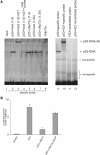DeltaNp73, a dominant-negative inhibitor of wild-type p53 and TAp73, is up-regulated in human tumors
- PMID: 12235210
- PMCID: PMC2194062
- DOI: 10.1084/jem.20020179
DeltaNp73, a dominant-negative inhibitor of wild-type p53 and TAp73, is up-regulated in human tumors
Expression of concern in
-
Expression of Concern: ΔNp73, A Dominant-Negative Inhibitor of Wild-type p53 and TAp73, Is Up-regulated in Human Tumors.J Exp Med. 2025 Jul 7;222(7):e2002017906102025e. doi: 10.1084/jem.2002017906102025e. Epub 2025 Jun 27. J Exp Med. 2025. PMID: 40576590 Free PMC article. No abstract available.
Abstract
p73 has significant homology to p53. However, tumor-associated up-regulation of p73 and genetic data from human tumors and p73-deficient mice exclude a classical Knudson-type tumor suppressor role. We report that the human TP73 gene generates an NH(2) terminally truncated isoform. DeltaNp73 derives from an alternative promoter in intron 3 and lacks the transactivation domain of full-length TAp73. DeltaNp73 is frequently overexpressed in a variety of human cancers, but not in normal tissues. DeltaNp73 acts as a potent transdominant inhibitor of wild-type p53 and transactivation-competent TAp73. DeltaNp73 efficiently counteracts transactivation function, apoptosis, and growth suppression mediated by wild-type p53 and TAp73, and confers drug resistance to wild-type p53 harboring tumor cells. Conversely, down-regulation of endogenous DeltaNp73 levels by antisense methods alleviates its suppressive action and enhances p53- and TAp73-mediated apoptosis. DeltaNp73 is complexed with wild-type p53, as demonstrated by coimmunoprecipitation from cultured cells and primary tumors. Thus, DeltaNp73 mediates a novel inactivation mechanism of p53 and TAp73 via a dominant-negative family network. Deregulated expression of DeltaNp73 can bestow oncogenic activity upon the TP73 gene by functionally inactivating the suppressor action of p53 and TAp73. This trait might be selected for in human cancers.
Figures























References
-
- Kaghad, M., H. Bonnet, A. Yang, L. Creancier, J.C. Biscan, A. Valent, A. Minty, P. Chalon, J.M. Lelias, X. Dumont, et al. 1997. Monoallelically expressed gene related to p53 at 1p36, a region frequently deleted in neuroblastoma and other human cancers. Cell. 90:809–819. - PubMed
-
- Jost, C.A., M.C. Marin, and W.G. Kaelin, Jr. 1997. p73 is a simian p53-related protein that can induce apoptosis. Nature. 389:191–194. - PubMed
-
- Zhu, J., J. Jiang, W. Zhou, and X. Chen. 1998. The potential tumor suppressor p73 differentially regulates cellular p53 target genes. Cancer Res. 58:5061–5065. - PubMed
-
- Zaika, A., M. Irwin, C. Sansome, and U.M. Moll. 2001. Oncogenes induce and activate endogenous p73 protein. J. Biol. Chem. 276:11310–11316. - PubMed
-
- Irwin, M., M.C. Marin, A.C. Phillips, R.S. Seelan, D.I. Smith, W. Liu, E.R. Flores, K.Y. Tsai, T. Jacks, K.H. Vousden, et al. 2000. Role for the p53 homologue p73 in E2F-1-induced apoptosis. Nature. 407:645–648. - PubMed
Publication types
MeSH terms
Substances
LinkOut - more resources
Full Text Sources
Other Literature Sources
Research Materials
Miscellaneous

